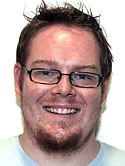It’s pretty hot, it has awkward streets packed with traffic, and it smells kinda funny, but it’s our home. Although many people don’t see it, Tucson actually is more than just a college stop. Tucson is a collection of culture, language, food, and traditions. It is a microcosm of the rest of the world, with its own local flair. Some see it as the ugly stepsister of Phoenix or an equal with Flagstaff, but it is so much more. When I originally came to Tucson for school, I was quite unsettled, but my brother said something that is more fitting the longer I am in this city: “”Tucson is like a fungus, it just grows on you.””
Sometimes Tucson seems very separated from the rest of the world. Sometimes it’s a little slow. When Spain’s trains were bombed, the University of Arizona Police Department had only recently received its bomb-sniffing dog. When Iran was arguing to advance its nuclear program, the UA’s nuclear reactor was being investigated for being insecure.
Though Tucson may feel like an entity distant from the global community, running almost backwards in time, it actually has deep connections to the rest of the world through its excellent research.
When a doctor in London needs an artificial heart, he will probably use the one the UA invented. The UA holds patents for an artificial heart, among other inventions, and is aggressively pursuing new discoveries with initiatives such the Biotechnology building.
When NASA needs to do practically anything, the UA is on its speed dial. From the new Mars probe, which may change the way we view our celestial neighbor, to one of the top-ranked astronomy programs in the nation, Tucson has changed the way we view space. If Tucson isn’t international, it’s at least interstellar. Even the Vatican called the UA to help with its new telescope.
The students at the UA also make Tucson diverse. With the international students here, there are various cultures present. Here in Tucson, you can chat with a Chinese student about engineering, talk Russian politics with a Tucson local and study theater with a Belgian immigrant. This is a grand collection of international minds and folkways, another sign of Tucson’s international integration. That’s not to mention Tucson’s sister cities, places like Pecs, Hungary, or Almaty, Kazakhstan. These are just a few of the ties outside the Old Pueblo.
But Tucson is not just the UA. A simple glance at the culinary diversity of Tucson shows how internationally integrated it is. It may seem superficial to use food as an indicator of diversity, but it’s quite the opposite. Where the food is, the people are as well. For example, the authentic Thai food in Tucson was brought by Thai immigrants who settled here.
Granted, Tucson is less global than many cities – New York makes it look simple and unconnected – but a closer look shows it’s not as disconnected as it may seem. Instead of joking about Tucson, or living here only for school, students should appreciate Tucson, including its global culture – the cooperation of many different ethnic groups, the fostering of a strong learning community and the embracing of international differences.
Tucson sometimes feels like it moves a little slower than the rest of the world, but that is not a bad thing. Who says everything should be nationally focused or internationally consequential? Tucson has assumed its role of intercontinental player with its technology and exporting of highly qualified students, but it has also taught them to take what Tucson has to the rest of the world.
These days it seems like everything is happening far away, but there is still a connection to Tucson. Maybe the world moves at a different speed, or looks like it does, but Tucson is a bigger part of the global scheme of things, and recognizing that is a big step in seeing Tucson for what it is; a worldly melting pot.
Mike Morefield is a political science senior who is dreading leaving the Old Pueblo. He can be reached at letters@wildcat.arizona.edu









